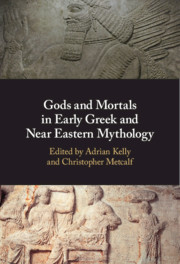Book contents
- Gods and Mortals in Early Greek and Near Eastern Mythology
- Gods and Mortals in Early Greek and Near Eastern Mythology
- Copyright page
- Contents
- Tables
- Contributors
- Acknowledgements
- Abbreviations
- Introduction
- Part I Contexts
- Part II Influence
- Part III Difference
- Chapter 11 Borrowing, Dialogue and Rejection
- Chapter 12 Divine Labour
- Chapter 13 Influence and Inheritance
- Chapter 14 Fate and Authority in Mesopotamian Literature and the Iliad
- Chapter 15 Fashioning Pandora
- Chapter 16 Sexing and Gendering the Succession Myth in Hesiod and the Ancient Near East
- Bibliography
- Index
Chapter 16 - Sexing and Gendering the Succession Myth in Hesiod and the Ancient Near East
from Part III - Difference
Published online by Cambridge University Press: 27 March 2021
- Gods and Mortals in Early Greek and Near Eastern Mythology
- Gods and Mortals in Early Greek and Near Eastern Mythology
- Copyright page
- Contents
- Tables
- Contributors
- Acknowledgements
- Abbreviations
- Introduction
- Part I Contexts
- Part II Influence
- Part III Difference
- Chapter 11 Borrowing, Dialogue and Rejection
- Chapter 12 Divine Labour
- Chapter 13 Influence and Inheritance
- Chapter 14 Fate and Authority in Mesopotamian Literature and the Iliad
- Chapter 15 Fashioning Pandora
- Chapter 16 Sexing and Gendering the Succession Myth in Hesiod and the Ancient Near East
- Bibliography
- Index
Summary
This chapter considers the case of the Song of Emergence that has proved central to several contributions collected here, but approaches the comparison as an opportunity to appreciate the distinctive differences reflected in the various relevant sources. This chapter emphasises the role of female wife–mother figures as destabilising elements in Hesiod’s Theogony, in contrast to the more limited roles of female characters particularly in the Song of Emergence, and locates that gendering theme within the wider context of early Greek mythology. This comparison allows us to see the individual element working within its own context, to determine what is distinctive about each tradition and so, finally, to understand all of them better. Genealogy, at least in the way most Classicists would like to practise it, is neither possible nor profitable. But the comparison remains, and its analogy can tell us a lot.
Keywords
- Type
- Chapter
- Information
- Gods and Mortals in Early Greek and Near Eastern Mythology , pp. 276 - 291Publisher: Cambridge University PressPrint publication year: 2021
- 2
- Cited by

